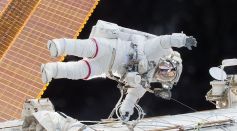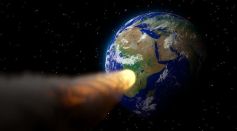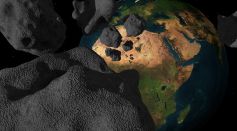Tags: Asteroids
Debris Disk Around Main-Sequence Star Can Help Scientists Find New Exoplanets When Asteroids Collide

Massive Asteroids, Comets Once Bombarded Earth That Altered Oxygen Levels in the Atmosphere
Planets, Sun, Moon, Asteroids Orbiting on the Same Plane; Reason for Such, Explored From 4.5 Billion Years Ago
Lucy Spacecraft Is One Step Closer to Trojan Asteroids; Preparations for First Mission Begins in Time for October Launch
Asteroid Deflection: How NASA, ESA Prepare for the Space Occurrence?
Largest Near-Earth Asteroid to Make Its Closest Approach This Weekend, But We Should Not Worry

NASA Names Asteroids After Diverse Group of 27 Trailblazing Astronauts
Crusts from Planets Similar to Earth Discovered in ‘Dying’ Stars
Minimoon Orbits Earth for 3 Years, But No One Knew?

Researchers Develops Ways to Deflect ‘Planet Killer’ Asteroid Hitting Earth

Four Asteroids Flew By Earth: What Dangers Do This Pose?
Defending the Earth from Asteroids
Asteroid Mining Campaign: Luxembourg Offers Enticing Opportunities For US Entrepreneurs From Silicon Valley
NASA Uses ESA's LISA Pathfinder Spacecraft To Find Traces Of Dust ‘Crumbs’ Left By Comets & Asteroids
Were the Moons of Mars from the Red Planet Or Stolen from the Asteroid Belt?
Most Popular

Memory and Learning: How the Brain Stores, Retrieves, and Forgets Information

Gut Microbiome 101: How Gut Bacteria Influence Immunity, Mood, and Metabolism

Antibiotic Resistance: How It Develops and Why Misuse of Antibiotics Is Dangerous

How Solar Activity Shapes Our Planet: What the Next Solar Maximum Means for Earth





